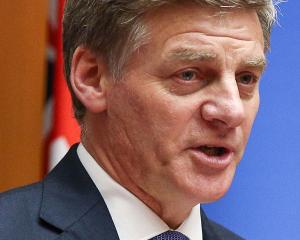The West is so blinkered by its superiority complex born out of victory in the Cold War that Mr Putin has long been categorised, and thus stigmatised, as the dull KGB operative who owed his ascendancy to having fewer enemies than anyone else and being in the right place at the right time.
The lesson the West seems incapable of learning is that while Mr Putin may exhibit all the charm, poise and civility of your average neighbourhood thug, you underestimate him at your peril.
Over the past week or so, he has been at his manipulative best in dictating the course of the crisis in Crimea while being careful to avoid too much spillover to the rest of Ukraine.
Loath to acknowledge he has run rings around them, the powers that be in Washington, London, Paris and Berlin thus have added reason to highlight his contempt for fundamental principles of international law.
In truth, his tactical triumph in annexing Crimea without a shot being fired has so stunned the West that the degree to which he has outsmarted its leaders is yet to sink in.
In Crimea, he has used ''salami tactics'' in effecting the annexation slice by slice, thus slowly accustoming everyone to what was going on. A Huffington Post headline neatly summed things up: Putin has been playing chess while the rest of the world is playing chequers.
Things could quickly get out of hand in the provinces of eastern Ukraine, which contain significant numbers of ethnic Russians.
Military intervention in those provinces would be a far bigger call on Mr Putin's part than the Crimea takeover and would risk Moscow finding itself locked into a ethnic guerrilla war.
There are signs that with Crimea - which has a far bigger proportion of ethnic Russians than those provinces - effectively under Moscow's control, Mr Putin will take a breather before determining whether to further infringe Ukraine's territorial rights.
Elsewhere, the casualties are mounting, although of a different kind. Barack Obama has looked and sounded feeble. What few positives left for him to take from his otherwise flawed and ordinary presidency are now withering on the Ukrainian vine.
His Secretary of State, John Kerry, has been exposed as a blowhard who conveys all the authority of a toothless tiger. Like other foreign ministries, the State Department in Washington supposedly recruits the best and the brightest. Searching questions need to be asked as to why its diplomats did not anticipate what Mr Putin would do after his ally, Viktor Yanukovich, was forced to flee from his presidential office in Kiev.
Both Mr Obama and Mr Kerry have since warned Mr Putin that Russia faces certain, unspecified ''consequences'' unless it pulls its forces out of Crimea.
The threat is about as empty as it is possible to get. With military intervention by the West utterly out of the question, the talk inevitably turned to sanctions, because they are all you can then talk about. It then becomes necessary to pretend sanctions will bring Mr Putin to heel. Otherwise, the West looks impotent. Everyone knows, however, that the track record of sanctions in removing despots and demagogues, or at least altering their behaviour, has veered between the hopeless and the truly pathetic down the years.
Other factors, however, further explain the West's failure to come up with a coherent and meaningful response to Mr Putin's two-finger salute.
First, his actions are the mirror image of military interventions by the United States - usually with close allies such as Britain in tow - which have been highly dubious in terms of international law.
The most obvious and notorious example is Iraq. George W. Bush's military adventure in that country drained the United States of all moral authority when it comes to lecturing other countries. Mr Putin's excursion in the Crimea has highlighted American hypocrisy. That was bound to happen at some point and fate has decreed that Mr Obama be the fall guy.
Second, the West's condemnation of Mr Putin is tempered by the acceptance in many quarters that his actions, while morally reprehensible, are also understandable to quite a large degree. In other words, you have to put yourself in Russia's shoes.
In Moscow's view, Ukraine's role is to serve as a buffer state. The prospect of a new government in Kiev joining the European Union or even Nato is beyond the pale, just as would be the loss of the Russian navy's warm-water port on the Black Sea.
Furthermore, Moscow is refusing to recognise the new administration in Kiev because it claims, with some justification, that the democratically elected one has been overthrown in what amounts to a coup by Ukraine's extreme right.
In the placing of such obstacles in the way of resolving the crisis, Mr Putin is using the standoff with the West to push his wider agenda of restoring Russia to superpower status. So where does all this leave New Zealand?
The answer is that the tyranny of distance has its virtues. The bottom-line, and something National and Labour agree on wholeheartedly, is that New Zealand's small-country status means it depends on the major powers abiding by international law and respecting territorial sovereignty. Of course, when it matters, those countries do the very opposite. Nevertheless, New Zealand is obliged to condemn Mr Putin's illegal breach of Ukraine's sovereignty.
New Zealand will probably sign up to any sanctions imposed on Moscow, more out of the need to show solidarity with the United States and like-minded European countries than to any effect.
The final stages of the negotiation of a free-trade agreement have been put on hold - a move probably more to New Zealand's cost than Russia's. In international affairs, such symbolic acts speak more than words.
Beyond that, there is not much else that New Zealand can do.
- John Armstrong is The New Zealand Herald political correspondent.




